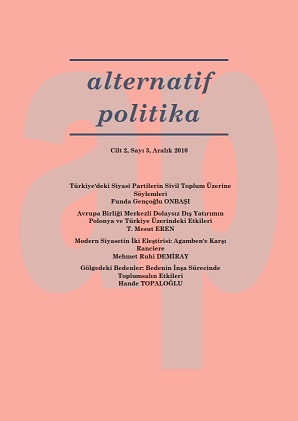Modern Siyasetin Iki Eleştirisi: Agamben’e Karşi Ranciere
Two Modes of Critique of Modern Politics: Agamben Versus Ranciere
Author(s): Mehmet Ruhi DemiraySubject(s): Political Philosophy, Political Theory, Government/Political systems
Published by: Rasim Özgür DÖNMEZ
Keywords: Agamben; Ranciere; Political theory; Critique; Democracy;
Summary/Abstract: This paper consists in a juxtaposition of detailed textual analyses of two influential works within contemporary critical political theory, namely Giorgio Agamben‟s Homo Sacer, and Jacques Ranciere‟s Disagreement. In doing this, my principal objective is to underline two points which are considered to be significant for both the theory and practice of democratic politics in our age. First, there are two major modes of critique. These are a form of radicalism entirely dismissing the established outlook and practices of democracy (e.g. Agamben) on the one hand, and another mode of critique in the sense of demanding the further promotion of the democratic promise of equality in the real world (e.g. Ranciere) on the other hand. Second, it will be contented that these two distinct modes are not equivalent in their capacity to provide guidance for our democratic political practices. That is, the immanent mode of critique represented by Ranciere's theory is much more significant in terms of its implications for political praxis.
Journal: Alternatif Politika
- Issue Year: 2/2010
- Issue No: 3
- Page Range: 224-250
- Page Count: 27
- Language: English

